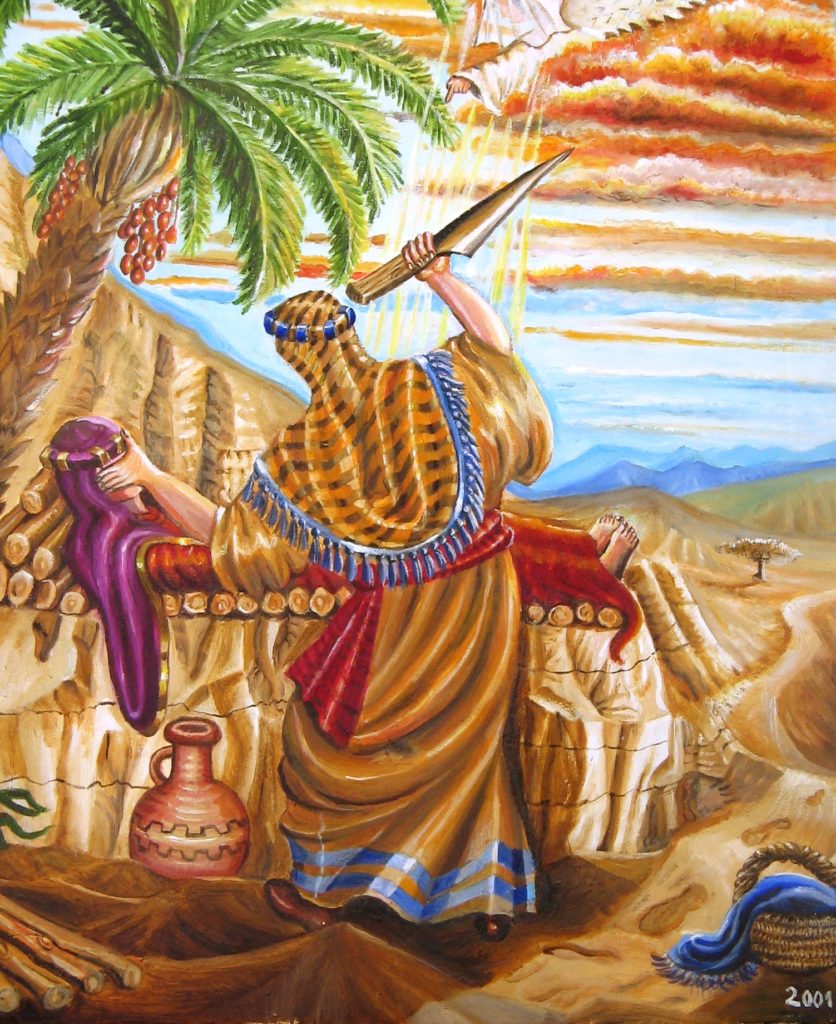[For articles on the “Sabbath of Va-Yeshev" in Hebrew, click here]
Rabbi Dr. Yossi Feintuch was born in Afula and holds a Ph.D. in American history from Emory University in Atlanta. He taught American history at Ben-Gurion University.
Author of the book US Policy on Jerusalem.
He is the rabbi of Congregation Shalom Bayit in Bend, Oregon.
* * *
As this weekly Torah portion, Va-Yeshev, seems to intimate, Joseph opted to live his life as a (highly appreciated) servant in Potiphar’s house without sending a word to his mourning father, Jacob, that he was alive. He would keep his silence about his whereabouts, if not of his well-being, even from the Pharaoh's palace, where he was the viceroy of Egypt. Even when his family moved to Egypt, Joseph was nowhere near his father during the 17 years that Jacob had lived in Egypt until his demise there.
[Picture: Joseph and Pharaoh... freebibleimages]
While Joseph's first message to his father after ''outing'' his true identity to his brothers was: ''You shall stay in the region of Goshen, you shall be near me'' (45:10), it appears that father and son hardly saw each other, though Joseph had their back in matters of generous sustenance. Only when Jacob sensed his forthcoming death ''he called his son Joseph'' to discuss with him his wishes for burial in Canaan, even in the Cave of Machpela.
Soon thereafter Jacob was already on his sickbed when word was sent to him of his father's condition. While Joseph hurried to his dying father he brought with him -- seemingly for the first time – his two sons, Menashe and Ephraim, whom Jacob did not see before, for he inquired with Joseph: ''Who are these? And Joseph said unto his father: 'They are my sons, whom God has given me here' '' (48:9). And Jacob replied: ''... God has let me see your seed also'' (v. 11). It is evident, then, that Joseph deprived his father and own sons from having grandfather-grandchild meaningful relations. All in all, Joseph did not try to be very close to his father, the father who was dotting on him in his growing up years.
Last week in the Va-Yishlach Torah portion one of the reasons why Jacob ‘’was greatly afraid and was distressed’’ (Genesis 32:8), prior to his imminent rendezvous with his brother Esau, was Jacob's awareness that when it comes to the sacred value of honoring one's parents he was in a deficit, certainly in comparison with Esau. For example, when Esau had realized that his marriages to two Hittite women displeased his father, he wedded another wife,Yishmael's daughter, Mahalat (or elsewhere, ''Basmat''), in the hope of appeasing his father with this endogamous marriage.
[Picture: the meeting of Jacob and Esau. Painter: Gustav Dora. The image is in the public domain]
For more than two decades Jacob was gone from his parents' domicile whilst he kept no contact with them to the extent that the Torah would tell us about it. Presently, he was afraid of the thought that Esau beats him hands down on account of honoring one's parents. We might expect, then, that upon his return home to Canaan Jacob would hurry up to reunite with his father. But this isn't what Jacob does as we read in the Torah last week. He travels to Succoth, and then to Shechem (where he buys some real estate), and on to Beth-el at God's command, and then en route to Ephrath (or Beth-lehem where Rachel dies), and on to the vicinity of Migdal-eder (where he actually dwells!). Finally he proceeds on ''to Mamre, to Kiriath-arba''(Hebron) to his father Isaac. (By this time Rebecca is most likely already dead.)
The text tells us absolutely nothing about a reunion, let alone a festive one (e.g., like between Moses and Jethro per Exodus 18: 7). Thereupon Isaac dies, and Esau travels from his land of Seir to join Jacob for the burial, where neither one of the sons laments or weeps for his dead father, as Abraham did for Sarah. It is quite a quandary, if not disturbingly disappointing, why Jacob tarried so long, while being already in Canaan, before he came to reunite with his father, but made it just in time for his burial...
When it comes to Isaac and his own relationship with his father Abraham it appears that the two did not see each other following the binding of Isaac on Mt. Moriah. Indeed in Ch. 22:19 Isaac is glaringly absent from being mentioned when Abraham and his two young men return to Beersheba. Nor would the two be mentioned thereafter as being together, not even at Sarah's burial in Hebron. And again, Isaac is on his own when he brings Rebecca ''into the tent of Sarah, his mother, and takes Rebecca as wife'' (24:67); Abraham is
nowhere to offer a feast.
[Bible Paintings / Binding of Isaac / Painter: Ahuva Klein (c), Oil on canvas]
When Abraham dies, Isaac (joined by Ishmael) buries his father with no textual references to either lamentation or mourning. Notably, when Abraham himself leaves for Canaan departing from his ''father's house'', Terah, his father, does not join him; he will live another six decades far away from his son, who would not attend his burial in Haran, unlike Esau who came from Seir to bury Isaac.
Evidently, the stories of the Hebrew patriarchs do not impress the reader as attesting to close and warm relations between fathers and sons. Is that why the Decalogue commands children to honor their parents while uniquely pledging a reward for children who do so? Is that why the prophet Malaachi concedes that only with the approaching of messianic times (''the great and terrible day of the Lord'') will Elijah the prophet ''turn the heart of the fathers to the children, and the heart of the children to their fathers'' (3:23-24)?
[For articles on the “Sabbath of Va-Yeshev" in Hebrew, click here]

![[Picture: Joseph would keep his silence about his whereabouts, if not of his well-being, even from the Pharaoh's palace... freebibleimages]](https://www.xn--7dbl2a.com/wp-content/uploads/2021/11/יוסף-1.jpg)

![[Picture: Joseph and Pharaoh... freebibleimages]](https://www.xn--7dbl2a.com/wp-content/uploads/2021/11/יוסף-ופרעה.jpg)
![[In the photo: the meeting of Jacob and Esau. Painter: Gustav Dora. The image is in the public domain]](https://www.xn--7dbl2a.com/wp-content/uploads/2019/12/פגישת-יעקב-ועשיו.jpg)



